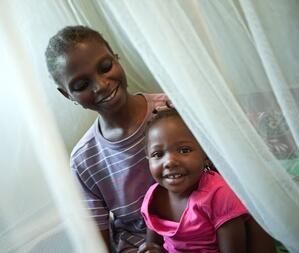
Today is World Malaria Day. It provides an opportunity to look back on the progress that has been made in recent years and commit to maintaining that momentum.
One of the weapons used to control malaria are insecticides. Pyrethroid insecticides have become common place, used in spraying homes and on mosquito nets. However the danger is looming that mosquitoes will become resistant to these insecticides, resulting in the advances in malaria control and many lives being lost. Interviewed for today’s edition of the Financial Times (registration required), Professor Janet Hemingway, LSTM Director, and CEO of the International Vector Control Consortium (IVCC), commented “we cannot assume that we’re going to have pyrethroids as a viable control tool for much longer”.
IVCC is working with the agro-chemical industry to develop new insecticides and overcome the barriers to bring these new products to the market. One such barrier is the World Health Organization evaluation process, which is acting as a barrier to innovation. Chief Operating Officer for IVCC, Tom McLean says “It produces a barrier to innovation among industry partners that’s severe at the moment” and that “there are a number of companies saying that they will not bring new products through until this is sorted out.”
Other fears exist in relation to the levels of funding available in the future. Here I Am campaigner Esther Teller from Cameroon talks about the importance of the Global Fund in delivering mosquito net distribution and the need to maintain support in this video. The Global Fund is a major financial contributor to the global efforts to control malaria, having distributed 310 million nets to at risk households.
Renowned global health and development expert and founder of Global Health Group Sir Richard Feachem has today, in an interview for the Huffington Post, commented on the shrinking malaria map saying “While these successes should be celebrated, we must also recognize that there are key challenges which can slow current momentum towards malaria elimination and eradication. First, the threat of emerging drug and insecticide resistance must be actively confronted. Two groups, the Medicines for Malaria Venture (MMV) and IVCC, are spearheading efforts to develop new drugs and insecticides to respond to emerging resistance. Meanwhile a major consortium of donors, scientists, non-governmental organizations and national programs are working to stamp out, or at least contain, parasite resistance to artemisinin in the Mekong region. This effort in South East Asia is hugely important to malaria efforts worldwide.”
According to the Roll Back Malaria Partnership “In Africa, malaria deaths have been cut by one third within the last decade; outside of Africa, 35 out of the 53 countries, affected by malaria, have reduced cases by 50% in the same time period. In countries where access to malaria control interventions has improved most significantly, overall child mortality rates have fallen by approximately 20%.”
To show your support you can visit the World Malaria Day website.